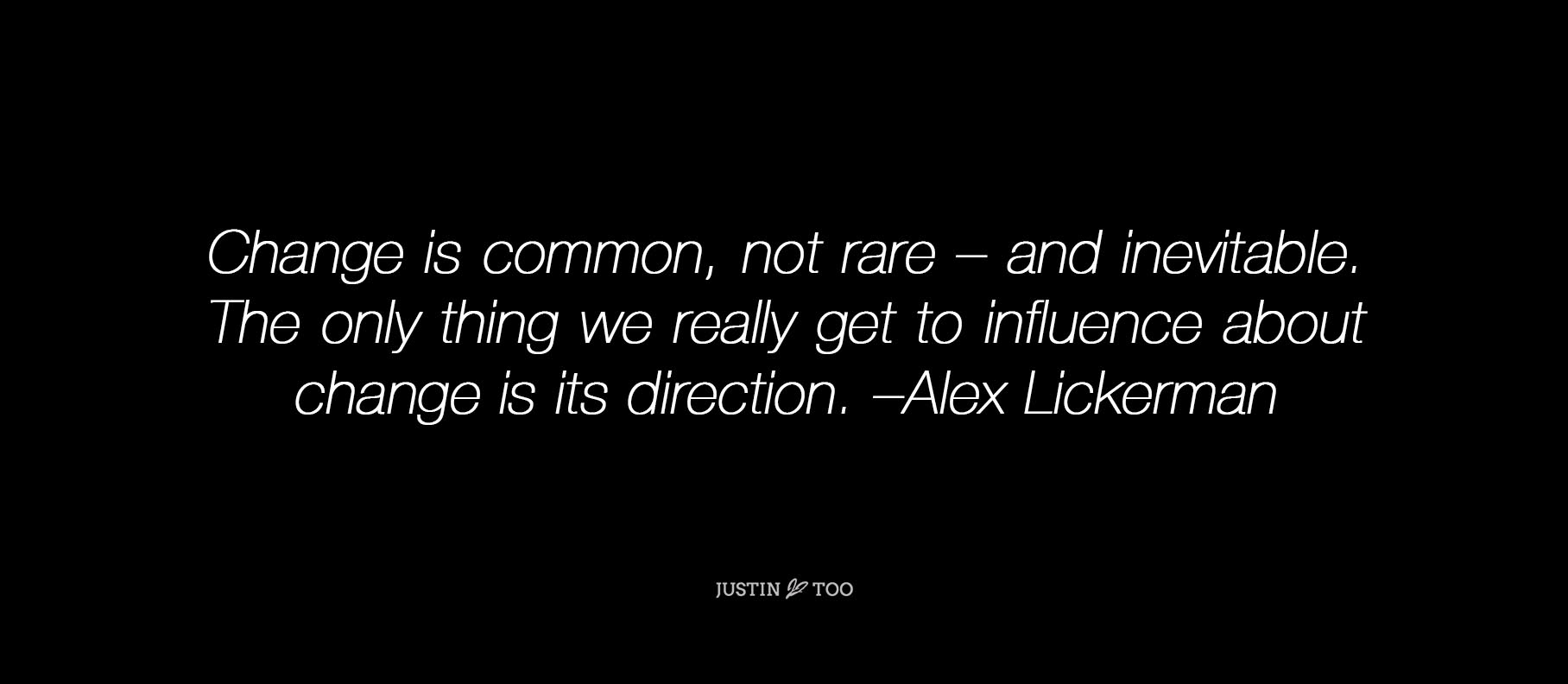Traditioned Innovation: Tradition without Traditionalism
Starting to Think About Tradition without Traditionalism
Tradition does have value and importance.
But like many things in life, a fine balance is required to maintain a healthy equilibrium.
We need to maintain our firm foundations while also building and renovating structures that are fitting for our constantly growing and evolving needs.

On a journey to piece together the future of the church, I’ve often wondered: How does one implement change in environments of established ways?
Last week, I enjoyed breaking bread with a local influential Silicon Valley leader, Pastor Paul Bain, Senior Pastor of Saint Samuel COGIC church and President of Project WeHOPE in East Palo Alto.
Pastor Paul is an artist with words, well versed and rehearsed in the Scriptures, catchy sayings, and vivid illustrations.
We talked at length on a variety of topics, but one of the most valuable things I took away from the conversation was gaining an awareness of the distinction between tradition and traditionalism.
Upon investigation on Google, I learned that traditionalism is the upholding or maintenance of tradition, especially so as to resist change. Traditionalism seems to think that we have never done wrong, or that nothing could ever be better.
But this is dangerously shortsighted and naive.
C.S. Lewis explained it well in The Case for Christianity:
We all want progress. But progress means getting nearer to the place where you want to be. And if you have taken a wrong turning then to go forward does not get you any nearer. If you are on the wrong road progress means doing an about-turn and walking back to the right road and in that case the man who turns back soonest is the most progressive man. There is nothing progressive about being pig-headed and refusing to admit a mistake. And I think if you look at the present state of the world it’s pretty plain that humanity has been making some big mistake. We’re on the wrong road. And if that is so we must go back. Going back is the quickest way on.

Traditioned Innovation
Strange enough, I’ve had a draft blog post on the topic of traditioned innovation from a month ago. Divinely coincidental, the original post did discuss the difference between tradition and traditionalism. I love it when God’s stars align!
The first article I read was Traditioned Innovation by L. Gregory Jones on Faith & Leadership. Below is a collection of poignant snippets that first introduced me to the notion of traditioned innovation:
Christian leaders are called to a particular type of social entrepreneurship – one that does not force us to choose preserving tradition or leading change, but thinking about them together. We are called to “traditioned innovation” as a pattern of thinking, bearing witness to the Holy Spirit who is conforming us to Christ.
In our thinking as well as our living, we are oriented toward our end, our telos: bearing witness to the reign of God. That is what compels innovation. But our end is also our beginning, because we are called to bear witness to the redemptive work of Christ who is the Word that created the world. We are the carriers of that which has gone before us so we can bear witness faithfully to the future.
Tradition is fundamentally different from traditionalism. Jaroslav Pelikan, in “The Vindication of Tradition,” characterized the difference when he wrote, “Tradition is the living faith of the dead; traditionalism is the dead faith of the living.” People who bear a tradition are called to be relentlessly innovative in ways that preserve the life-giving character of the tradition.
So also with institutions. We do not need radical change. The task of transformative leadership is not simply to “lead change.” Transformative leaders know what to preserve as well as what to change. We need to conserve wisdom even as we explore risk-taking mission and service. Too much change creates chaos. Transformative change, rooted in tradition and the preservation of wisdom, cultivates the adaptive work that is crucial to the ongoing vitality and growth of any organism, Christian institutions included.
Sometimes that will mean we innovate within existing institutions; at other times we will allow some forms to die so that other ones can rise up in their place. And at still other times we will give birth to new forms to address challenges and opportunities. But even our most dramatic transformations ought to be tethered to our most life-giving past.
The Biblical Perspective
The second article I read was by C. Kavin Rowe, called Traditioned innovation: A biblical way of thinking.
I highly recommend reading the article in its entirety, but for convenience, I’ve saved a collection of poignant snippets below that provides an enlightening biblical perspective on the subject:

Considered theologically, the future and the past belong together, tradition and innovation hand in hand. Traditioned innovation is a way of thinking and living that points toward the future in light of the past, a habit of being that requires both a deep fidelity to the tradition that has borne us to the present and a radical openness to the innovations that will carry us forward.
The Bible is a vast, sprawling book replete with countless winding trails. Navigating its story is best done with a compass whose points are creation, fall, election, redemption and consummation – the theological framework in which traditioned innovation gets its meaning.
1 Creation
Creation is the original innovation. God begins the world’s life out of nothing.
2 Fall
The narrative in Genesis of the fall powerfully illustrates that the givenness of creation is no longer simply good. It has become fractured by our refusal to acknowledge our ultimate dependency on the world God made and our attempt to become self-made creatures – as the Bible puts it, “to know as God knows.” Recognizing the destruction that occurs when we deny our embeddedness in created life should cause us to be wary of attempts to dispense with everything in the past (regardless of the particular shape or kind of institution). “Everything” cannot change. We cannot rid ourselves of the world.
And yet, the fall also points directly to the necessity of innovation. Tradition is no longer sufficiently sustaining in itself. We cannot simply declare, in imitation of God’s view of original creation, “this is good.” And, therefore, we cannot fully rest. We must toil and move on. The character of fallen creation forces us to improvise, to try to move again within the goodness of God’s originating purpose. Innovation thus becomes a necessary way of life in a world of sin and shortcoming, of brokenness and the need for new life. Adam and Eve must make their way outside the garden.
3 Election
The election of Abraham illustrates paradigmatically how God responds to the way we have marred the goodness of the gift. Instead of destroying his creation, we can see God’s overarching response in the Old Testament in the calling of a people whose vocation is at once to embody the enduring goodness of the gift and to testify to the universal need for redemption. God does not, that is, simply scrap the world and make it all over again. Rather, God innovates. He responds to the brokenness of the world with a creative, new act – indeed, one that could not, at least on the face of it, have been anticipated from the primeval history in Genesis.
4 Redemption
To think about redemption in the biblical sense is to see that this divine pattern of “newness without completely throwing away the old” culminates in Jesus Christ. According to the New Testament, God recreates the world in the life, death and resurrection of Jesus of Nazareth.
Whoever is in Christ, says Paul, is a new creation (2 Corinthians 5:17). In Christ, that is, the innovation of God is at its peak. In Christ, he remakes the foundations of human life in the very midst of the ongoing, long-running and everyday traditions of the world.
Focusing on redemption thus discloses a productive tension that marks all life until the end. To remain in what is already known of the tradition is to refuse the priority of new creation; and yet, that which is new includes the old. Radical innovation? Yes. Radical continuity with tradition? Yes.
5 Consummation
Consummation points to the hope that creation and redemption will finally coincide, that the world’s traditions will, as it were, catch up with the reality of a cosmos remade – that God’s founding innovation and tradition will be one with his most radical innovation in Jesus Christ.
Thinking about traditioned innovation in light of the hope of consummation shows that tradition and innovation are not finally two different ways of being in the world. They are instead a helpful way to speak about the fundamental manner in which the Triune God graciously relates to the world he made and to which, in the face of its profound brokenness, he remains everlastingly committed – anew. We cannot think, therefore, that tradition and innovation are opposites. In the Bible, tradition and innovation are realities of our common human life, inseparable aspects of participating in the world God made and is redeeming. Tradition and innovation go together in the divine purpose that leads toward the final restoration of God’s good creation.
To the extent that we both remain faithful to tradition and innovate – even radically – we will follow the pattern of the creating and redeeming God of Scripture, and will, therefore, flourish. This is not to say that the flourishing of human life will be apparent immediately to us in the present. After all, flourishing in the biblical sense is frequently counterintuitive. Israel wandered for 40 years in the desert, Moses never made it to the promised land and Jesus was killed – to take only a few striking examples. But it is to say that the underlying and ultimate purpose to which our lives will be oriented will be in harmony with the work of the God of the Bible.


